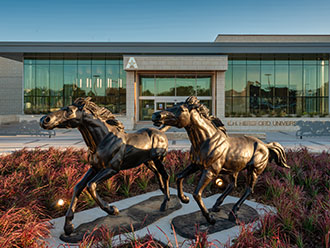Faith Magness started her academic career at The University of Texas at Arlington thinking what many might think when they hear the words “disability accommodation”—that it’s help for people with visibly noticeable conditions, like someone in a wheelchair. Then Magness by chance encountered the Student Access & Resource (SAR) Center.
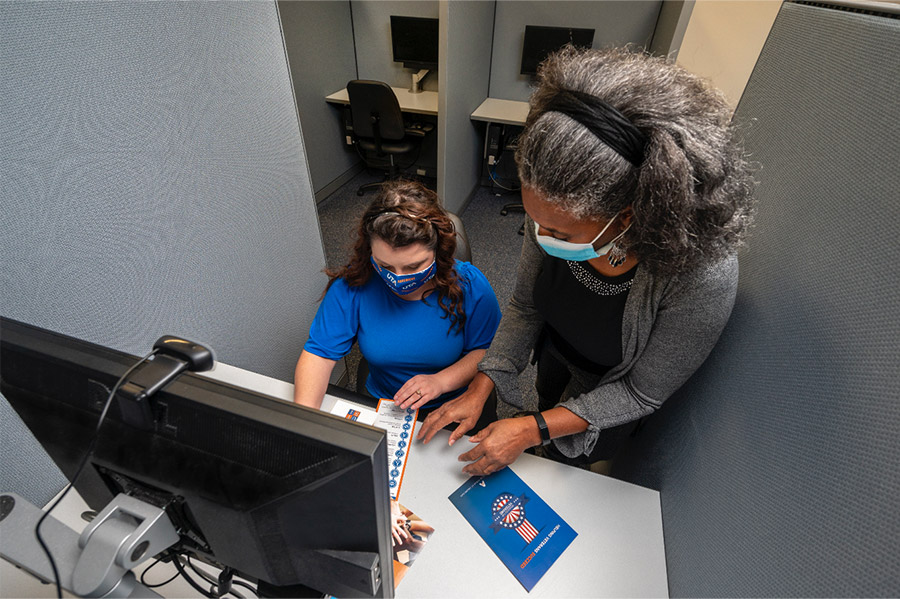
Elvira Smith assists Faith Magness (seated).
While walking through the University Center, she saw a display that featured a mirror. The display informed those who peered into the mirror that there are all sorts of things, many unseen to the eye, that the SAR Center can help students with at UTA.
“I believed the stigma for a long time, that disabilities mean you have these obvious challenges,” says Magness. “But that day I learned that there were resources on campus to help me with my ADHD, which I never knew was recognized as a disability.”
Magness had developed strategies for her attention deficit hyperactivity disorder (ADHD) in high school that she soon discovered were no match for the stresses of life as a college student. Learning time management skills was something Magness said greatly contributed to her success at UTA.
“Learning to prioritize things, I would guess how long an assignment would take me to complete, and then I would double that,” she says. “If I guessed that something would take me 30 minutes, then I would set aside an hour. Because in reality, I’m hoping it would take me 30 minutes, but if it becomes very challenging, then allowing myself that extra time would help with my anxiety about the assignment.”
Magness was grateful to learn about these resources that she did not even know existed for her on campus.
NEW NAME, BROADER REACH
This year, UT Arlington’s Student Access & Resource Center changed its name from the Office for Students with Disabilities to better reflect its mission of service to all students with access needs that fall under the Americans with Disabilities Act Amendments Act.
“Regardless of the name change, our role on campus is to ensure and provide accommodation and to support, as much as possible, equal access,” says Cynthia Lowery, director of the SAR Center. “We want to provide opportunities for accessibility to all UTA students.”
The Americans with Disabilities Act is a law, passed in 1990 and amended in 2008, that prohibits discrimination against individuals with disabilities in the public sphere. This includes schools, places of employment, public transportation, and anywhere else that is open to the public. The ADA is a comprehensive civil rights legislation that prohibits discrimination and guarantees that people with disabilities have the same opportunities as everyone else to participate in the mainstream of American life.
The SAR Center not only underwent a name change this year but has also grown in staff and technological capabilities. Within UTA’s Division of Student Affairs, the SAR Center does far more than provide accommodations for students with physical disabilities—it also provides specialized fonts for dyslexia, extra time on tests and assignments, or allowing service and/or emotional support animals in campus housing.
INCLUSION, ACCEPTANCE, EMPOWERMENT
The majority of students who qualify for services on a college campus have unseen disabilities. This group is greatly underserved for various reasons, such as social and cultural stigmas about disability, but primarily because they often do not know or understand that they qualify for support under ADA law.
“Our goal is to grow the center and reach those students who qualify for resources under ADA law but have never come through our doors,” says Lowery. “There should be nothing negative about disability. I want to get them through our doors so we can get started.”
Lowery says that the SAR Center is striving to reach the national standard of service for a college or university campus, which on average is 19% of students. She is most passionate about using best practices for supporting students with disabilities; internal and campus programming that increases inclusion, student engagement, academic retention, and success; and collaboration with other departments on campus.
“Anything we can do that promotes inclusion, acceptance, empowerment, and destigmatizing for the personal and academic success of students with disabilities is the foundation for what we’re trying to accomplish at the SAR Center,” she says. “We want UTA students to complete their academic goals and become empowered in their own personal understanding that they can do anything they choose to do through patience and persistence.”
The SAR Center office is stepping up outreach with information on who qualifies with the hope that this will begin to break down stigmatization barriers and, in general, broaden direct services for greater accessibility.
“A lot of people just don’t know what we do,” says Jonathan L. Johnson, who was named assistant vice president for health and wellness in 2019. “There are a lot of students who we serve. It can be accommodations, academic counseling, alternative testing, or a range of assistive technology for students. The students’ experience at UTA is very dynamic.”
As the inaugural assistant vice president for health and wellness in the Division of Student Success, Dr. Johnson integrates health and wellness resources on campus. In addition to the SAR Center, he oversees Health Services, Campus Recreation, and Counseling and Psychological Services.
“Developing a well-being and wellness curriculum with an institutional mission and strategic goals will help advocate for wellness on campus,” he says. “Having a collective voice is important for people to recognize that we all have a part in engaging our community with regards to health and wellness.”
“Our goal is to grow the center and reach those students who qualify for resources under ADA law but have never come through our doors.”
A HISTORY OF SUPPORT
UTA offers a physically accessible campus and dedicated staff to assist and guide students of all abilities, as well as a long history of going beyond compliance before ADA was required in terms of inclusivity.
UTA installed its first curb ramps—or as The Shorthorn referred to them, mini-driveways—in 1970, the first permanent solution for those with mobility accommodation needs at UTA. Later, in 1974, then-UT Arlington President Wendell Nedderman participated in a daylong event that invited administrators to experience firsthand many of the problems students with disabilities faced attending UTA in the 1970s.
Regarding the experience, Dr. Nedderman said, “I gained a whole new perspective from the vantage point of a wheelchair.”
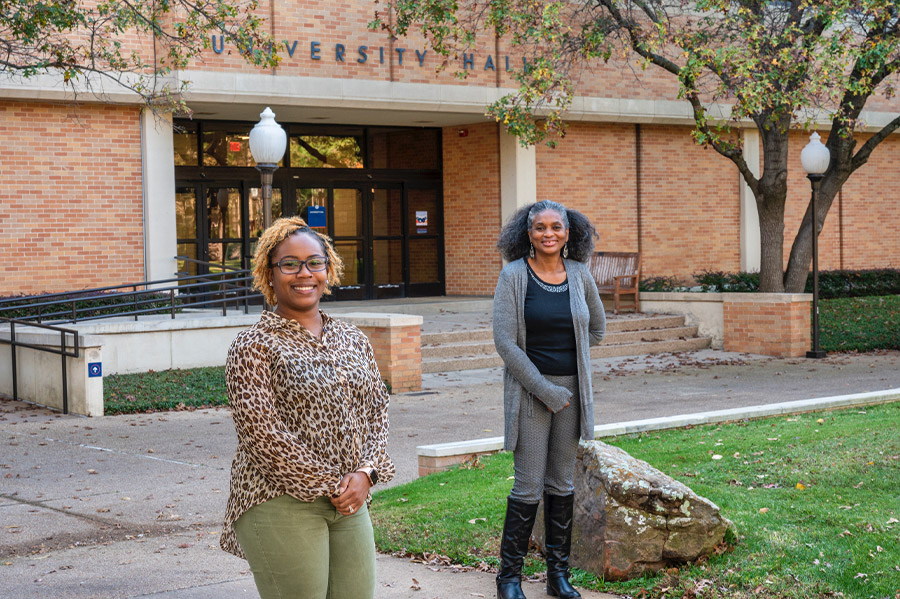
Tiffani Riddick (left) stands with Elvira Smith outside of University Hall.
Another well-known figure who championed for accommodation at UTA was Jim Hayes. Hayes graduated from the University in 1974, where he was president of the Handicapped Students Association and the UTA student body. He also served as the coordinator of compliance with the Americans with Disabilities Act. In 1976, he helped found the Office for Students with Disabilities, eventually becoming its director, and helped create the Movin’ Mavs, UTA’s wheelchair basketball team, in 1989.
UTA’s rich history of embracing innovation and creativity also includes adaptive sports scholarships along with programs like the Movin’ Mavs and the Lady Movin’ Mavs. More recently, the University created an interdisciplinary Minor in Disability Studies, led by Sarah Rose, associate professor of history.
A comprehensive timeline of the history of accessibility at UT Arlington and the Texas Disability History Collection can be explored thanks to online exhibits through the UTA Libraries. The Texas Disability History Collection shows how a diverse group of disability rights activists in the state—many of whom attended or have worked at UTA—played a pioneering role in the fight for equal access to education, work, and more.
EQUAL ACCESS PIONEERS
After students pushed for a more accessible campus in the early 1960s, UTA became a model campus for Texas and the greater Southwest. Eventually, that push for access expanded to state and national disability rights advocacy, with the aim of making higher education accessible for everyone.
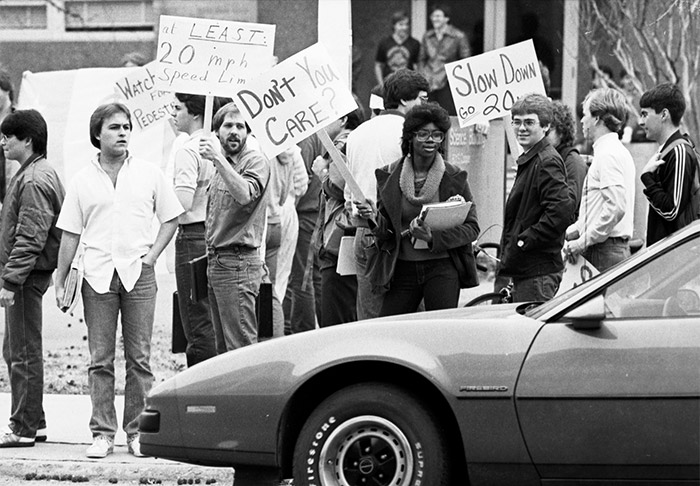
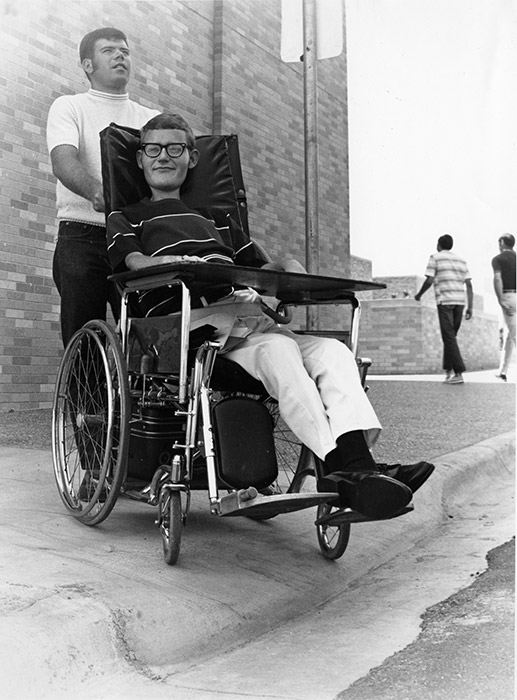

Clockwise, from top left: Part of making The UTA campus more accessible was tackling the problem of Cooper Street, which began with a protest for reducing the speed limit through campus.
Sam Provence (in wheelchair) was chairman of UTA’s Handicapped Students Association in the early 1970s. He helped launch a statewide campaign against physical barriers on college campuses.
The Movin’ Mavs wheelchair basketball team celebrates its Final Four victory in 1994.
Photos from the University of Texas at Arlington Libraries
GUIDING THE PROCESS
“UTA has a history of growing inclusion practices and programs for our students with disabilities,” says Doug Garner, head coach of the UT Arlington Movin’ Mavs. “Accessibility is not only about the physical environment, but also about creating a culture of acceptance and awareness while providing services and programs that reach out to and include all students in our UTA community.”
Accessibility specialists at the SAR Center provide aid and guidance to students in personal, academic, and career matters. In addition to providing services to students, they also strive to be a resource to faculty and staff.
“We encourage students with disabilities to confidently grasp their full potential and not feel limited by their unique challenges,” says Lowery. “The SAR Center team is passionate about supporting and advocating for the academic success of the students we serve.”
Tiffani Riddick, another accessibility specialist at UTA who is focused on working with the deaf/hard of hearing population by communicating using American Sign Language, thinks students from all backgrounds can be successful at a university.
“Seeing a student who may have been told they weren’t college material in the past be successful and receive their degree is the best feeling,” she says. “I believe the SAR Center is important to help students be on an even playing field with their peers. Some may see accommodations as a leg up; in reality, it’s a way of making the learning experience equitable for all students.”
Elvira Smith, associate director of the SAR Center, carries a large caseload of students with disabilities. She makes sure her students have every opportunity for success even after graduation, alerting them to the Job Accommodation Network in the event they may need workplace accommodations as well.
“I have been there for some students starting from when they were freshmen to completing their bachelor’s, going on to complete their master’s degree, and then becoming employed in their field of study,” she says. “Receiving communication, like a card or an email, from a student that says the support they received really made a difference is one of my favorite things.”
PROVEN RESULTS
Smith personally worked with Magness throughout her time at UTA while she finished her Bachelor of Social Work and her Master of Social Work. Magness would touch base with Smith at least once a semester to seek support, check in, and make sure she was staying on the right track, much like a student does with an academic advisor.
“Seeing a student who may have been told they weren’t college material in the past be successful and receive their degree is the best feeling.”
“It felt amazing to have someone in my corner, helping me advocate for myself if I needed, for example, extra time on a test,” says Magness. “That advocacy helped me feel safe and secure in learning how to become a successful adult at UT Arlington.”
Magness graduated with her master’s degree in the summer of 2020 and is currently studying for the Licensed Master Social Worker exams. She’s looking forward to being able to help people, providing the kind of assistance that she feels would have benefited her growing up. She hopes to one day open her own practice.
“I feel like I relate to the people in the field who social workers are trying to help,” says Magness. “Sometimes people are trying and trying, but they just need someone to throw them a rope. My experience at UT Arlington was empowering and helped me learn that I was capable all along. I want to help others in that way.” uta


